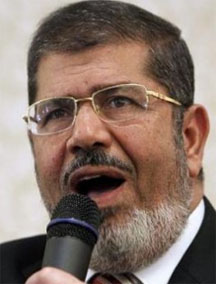CAIRO, (Reuters) – President Mohamed Mursi was expected to press ahead today with talks on ways to end Egypt’s worst crisis since he took office even though the country’s main opposition leaders have vowed to stay away.
Cairo and other cities have been rocked by violent protests since Nov. 22, when Mursi promulgated a decree awarding himself sweeping powers that put him above the law.
The upheaval in the most populous Arab nation, following the fall of Hosni Mubarak last year, worries the West, in particular the United States, which has given it billions of dollars in military and other aid since Egypt made peace with Israel in 1979.

Mursi’s deputy raised the possibility that a referendum set for Dec. 15 on a new constitution opposed by liberals might be delayed. But the concession only goes part-way towards meeting the demands of the opposition, who also want Mursi to scrap the decree awarding himself wide powers.
Yesterday, large crowds of protesters surged around the presidential palace, breaking through barbed wire barricades and climbing on tanks guarding the seat of Egypt’s first freely elected president, who took office in June.
As the night wore on, tens of thousands of opposition supporters were still at the palace, waving flags and urging Mursi to “Leave, leave”.
“We will stay here for as long as it takes and will continue to organise protests elsewhere until President Mursi cancels his constitutional decree and postpones the referendum,” said Ahmed Essam, 28, a computer engineer and a member of the liberal Dostour party.
Vice President Mahmoud Mekky issued a statement saying the president was prepared to postpone the referendum if that could be done without legal challenge.
Mursi’s planned dialogue meeting was expected to go ahead on Saturday in the absence of most opposition factions. “Everything will be on the table,” a presidential source said.
Mursi could be joined by some senior judiciary figures and politicians such as Ayman Nour, one of the candidates in Mubarak’s only multi-candidate presidential race, in 2005, in which he was unsurprisingly trounced.
The opposition has demanded that Mursi rescind the decree giving himself wide powers and delay the vote set for Dec. 15 on a constitution drafted by an Islamist-led assembly which they say fails to meet the aspirations of all Egyptians.
The state news agency reported that the election committee had postponed the start of voting for Egyptians abroad until Wednesday, instead of Saturday as planned. It did not say whether this would affect the timing of voting within Egypt. Ahmed Said, leader of the liberal Free Egyptians Party, told Reuters that delaying expatriate voting was intended to seem like a concession but would not change the opposition’s stance.
The opposition organised marches converging on the palace which Republican Guard units had ringed with tanks and barbed wire on Thursday after violence between supporters and opponents of Mursi killed seven people and wounded 350.
Islamists, who had obeyed a military order for demonstrators to leave the palace environs, held funerals on Friday at Cairo’s al-Azhar mosque for six Mursi partisans who were among the dead.
“With our blood and souls, we sacrifice to Islam,” they chanted.
A group led by leftist opposition leader Hamdeen Sabahy has called for an open-ended protest at the palace.




